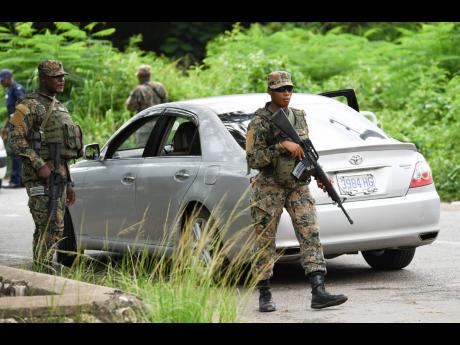SOE PRESSURE - Long hours, poor working conditions take toll; Clarendon,St Catherine operations to further stretch resources
A police constable deployed to hotspot communities blanketed by the Government’s enhanced security measures has warned that long hours, substandard working conditions, and inadequate resources are threatening to undermine their effectiveness.
The constable spoke to The Gleaner yesterday on condition of anonymity, hours after Prime Minister Andrew Holness announced that Clarendon and St Catherine were now under a state of public emergency (SOE).
The cop admitted that Holness’ announcement immediately caused him some trepidation.
“More police and soldiers a go feel the wrath that we a feel,” said the constable, speaking from one of the SOE checkpoints.
He said that “on paper”, the men and women of the police force are scheduled to work 12-hour shifts in the areas covered by a state of emergency or the zones of special operations, but more often than not, he is on duty for up to 15 hours at least four days per week.
“We are human, and it takes a toll on the body. Sometimes you go home, the only thing you can do is sleep. Trust me, it really has a negative impact on you,” added the constable, who made it clear that he was in full support of the SOE. “It’s a good thing for the country and the citizens, don’t get me wrong, but from our perspective, it takes a toll on us.”
The constable complained, too, that the dust pollution and inadequate bathroom facilities at some checkpoints were intolerable.
“Most persons, their sinus take them more often, or the dust blow in the food – the breakfast, lunch, supper – or the water that you are drinking,” he said.
The Police Federation, which caters to the welfare of rank-and-file members of the Jamaica Constabulary Force (JCF), disclosed that it had also received complaints about long working hours, poor quality of meals and insufficient personnel being deployed in the areas of operation.
The group’s chairman, Sergeant Patrae Rowe, revealed that the wage agreement signed with the Government stipulates that police personnel up to the rank of inspector should do a 40-hour work week “with a contingency for 10 additional hours per week”.
“However, we have been seeing a consistent breach of that agreement … . Our members are routinely being detailed and are working 60 hours – 70 hours in some instances – per week. And bear in mind that they are not paid for hours worked over 50 hours per week,” Rowe told The Gleaner yesterday.
He argued, too, that the deployment of police personnel in the state of emergency and zones of special operations loses its effectiveness because of the extended period over which police personnel are on duty.
In announcing the enhanced security measure in St Catherine and Clarendon, Holness acknowledged that he was “always concerned about stretching ... [the] resources” but insisted that his administration did not declare an SOE in an arbitrary manner.
“In management, sometimes you recognise that you don’t know your true limit until you are tested, and the Jamaica Constabulary Force and the Jamaica Defence Force continue to prove that they can stand up to the challenges,” Holness said.
“I’m not telling you that it is not without sacrifices and challenges, but as we stand here, we can say that we have taken into consideration all potential threats and challenges,” the prime minister added.
Police Commissioner Major Antony Anderson revealed that since the start of the year, the two police divisions in St Catherine had recorded a total of 157 murders – 91 in St Catherine South and 66 in St Catherine North.
In Clarendon, he said that 100 persons had been murdered since January 1, the second-highest number recorded across the 19 police divisions islandwide.
Anderson defended the use of the SOE, pointing out that since it was imposed in St James, Hanover, Westmoreland, and St Andrew South Police divisions earlier this year, murders have dipped 24 per cent, 50 per cent, 61 per cent, and 75 per cent, respectively.
“We feel it is our duty to stand between those who would do harm and those in danger. We must save the lives of our citizens and reduce the fear and anguish that communities feel when violence goes unchecked,” he said.

